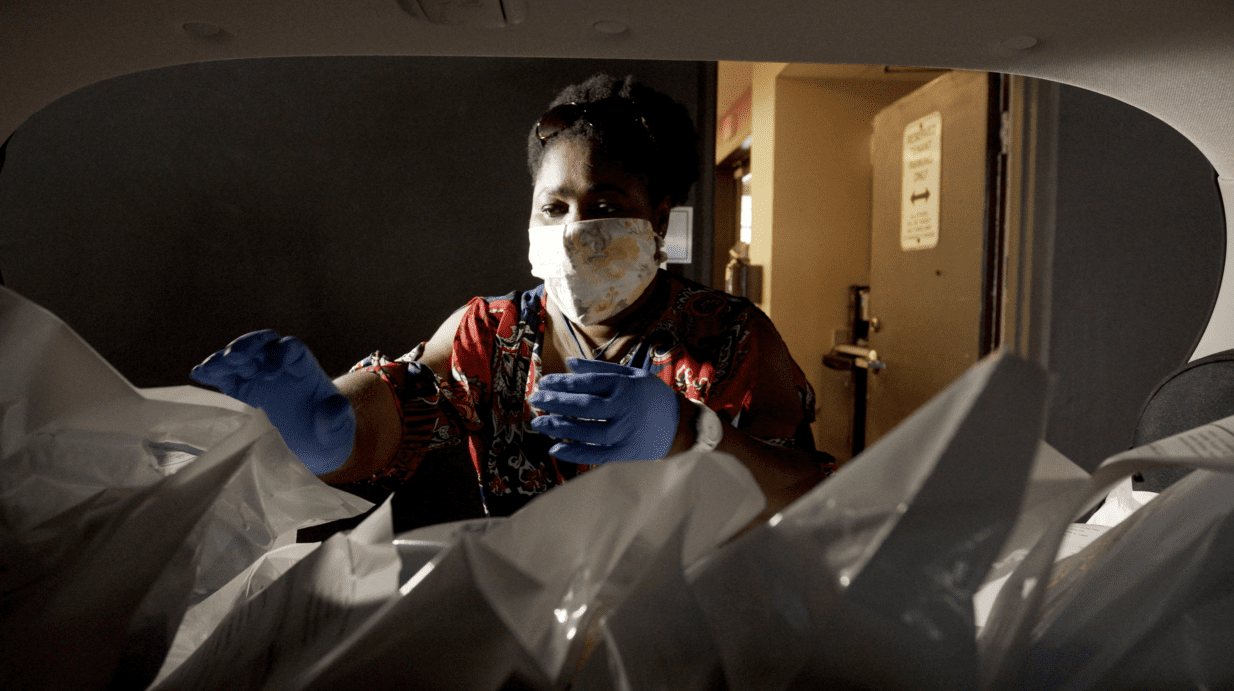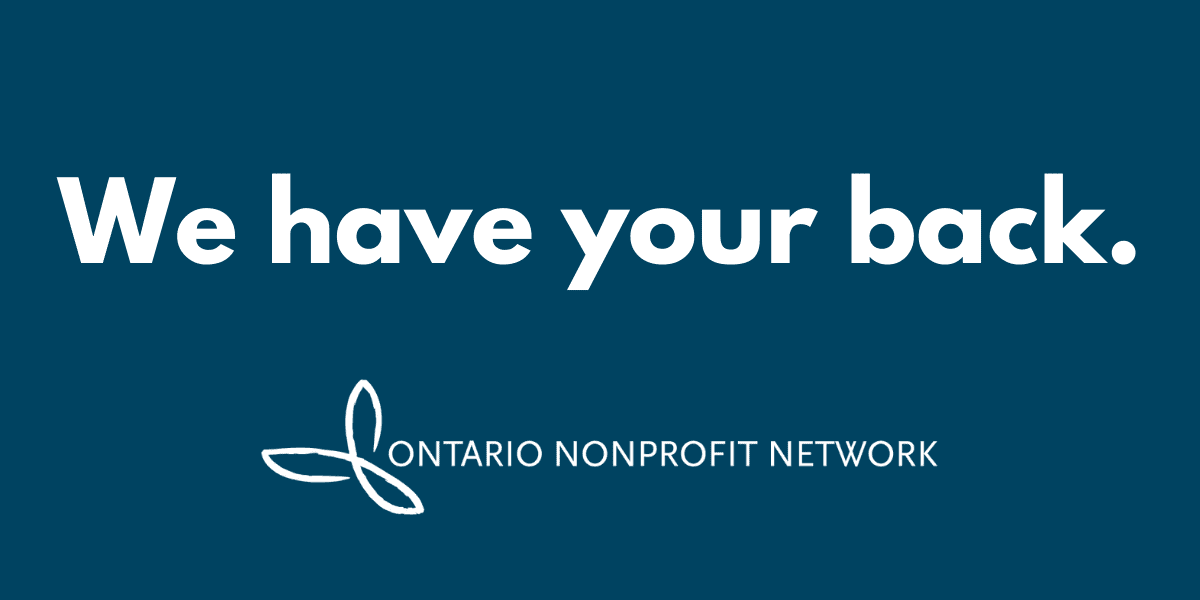
Blog
Paid sick days can help us beat the pandemic
Ontario faces an uncertain start to 2021, as cases of COVID-19 continue to grow, along with concerns over how to vaccinate nearly 15 million people. While the recently announced state of emergency will hopefully help slow infection rates, we need stronger supports to ensure that people can afford to stay at home.
Paid sick days would provide a more fair, equitable, and consistent approach to managing the COVID-19 pandemic. A growing chorus of nonprofit, business, health care, and community voices are calling for paid sick days. Clearly, there’s a strong consensus on the issue. Now it’s time for the provincial government to act.
Why should the nonprofit sector care?
Paid sick days can help nonprofits stay healthy while continuing to support their communities. They can be leaders in the movement, as employers, but also as organizations often serving people who are most vulnerable.
ONN has long advocated for paid sick days as part of decent work, and is disappointed not to see them as part of the Ontario government’s measures announced to date to control the pandemic. ONN supports the call for seven sick days per year (plus 14 additional days during pandemics).
It’s a matter of health and safety
Evidence indicates that workplaces are often significant sites of infection – across multiple sectors. Retail, construction, logistics, manufacturing, and food processing industries, as well as health care, education, and long-term care facilities have all seen outbreaks. Infections cut across the public and private sectors, and can hit large and small organizations alike.
But not all organizations offer the same supports for employees. While some provide paid sick days and other health benefits, many do not, often leaving employees with an impossible decision: be safe and lose pay, or risk their health and the health of others to sustain their income. A province-wide mandate for employers to provide paid sick days would even the playing field and help ensure stronger compliance with public health advisories.
Research shows that workers don’t abuse the system when they have access to paid sick days. One U.S. study found that on average, workers use about two paid sick days per year, while nearly half of all workers with paid sick days don’t use them at all.
Paid sick days don’t necessarily cost more. They not only reduce workplace and community spread of illness, but also reduce employee turnover and can help organizations save money in the long run. Shuttered businesses due to long-term lockdowns or loss of staff are costly.
It’s a matter of equity
Only some workers in Canada have access to paid sick days (only 42%, according to one national study), and access is not equitable. For instance, workers in hospitality and construction are less likely to have paid sick days, as are part-time workers.
There are many dimensions to inequality and inequity when it comes to paid sick days:
- Women are often primary caregivers in the home and usually are the ones taking time off to care for their children, elders, and people in their families when they are sick.
- Racialized, Black, immigrant, and migrant women are particularly concentrated in care work, which is at the frontlines of pandemic control, and is often low-waged, low-valued, and precarious. This can put them at greater risk of contracting the virus
- Paid sick days help assure continued labour market participation for women, and can reduce reliance on other types of income support, which may help ensure women don’t drop out of the labour force completely
Don’t we already have paid sick days?
The short answer is no. Provincial rules allow most workers to take up to three days of unpaid sick leave each year without risking losing their jobs (special rules apply for some occupations.). The provincial government has expanded this coverage for unpaid sick days for workers in quarantine or isolation due to COVID-19, or providing care to children at home due to school or daycare closures. (In 2018, workers were briefly entitled to two paid sick days before the government changed the legislation).
More recently, the federal government has created the Canada Sickness Recovery Benefit (CSRB) as a response to the pandemic. The CSRB provides $500 a week for up to two weeks for workers who are unable to work because they are sick or need to self-isolate due to COVID-19, or have an underlying health condition that puts them at greater risk of getting the virus.
But there are limitations to the benefit, which is quite different from paid sick days. You have to apply for the CSRB, much like employment insurance, which means benefits come later, not through your regular paycheque. And $500 a week is less than what a full-time worker would earn at minimum wage in Ontario.
While Ontario’s premier has suggested the federal government make improvements to the CSRB to address these concerns, it still remains an inadequate alternative. A much more adequate solution would be to mandate paid sick days for all Ontario workers.
A clear consensus from across the province
Policy makers, health care workers, business people, and community representatives have all called on the province to introduce paid sick days for all Ontario workers as a response to the pandemic. Doctors, hospital administrators, public health leaders, and community health organizations have been joined by the province’s own advisors, as well as many city mayors, the Ontario Chamber of Commerce, and small businesses.
The issue cuts across party lines. Ontario’s opposition parties (the NDP, Liberals, and the Greens) support paid sick days, as do a large majority of Canadians (88%), according to a new Environics poll. The government is missing an opportunity to do the right thing and what is expected from them by their constituents and voters.
Nonprofits know the importance of maintaining a healthy workforce to be able to continue serving communities. Paid sick days would give the organizations and communities across the province the support they need to help beat the pandemic. This issue has brought us together to build strong, effective solutions for our shared health and safety. Let’s keep the momentum going!
Take action
Contact your government officials: Share your support for paid sick days with your local MPP, as well as the Minister of Labour and the Minister of Health.
Some key messages to include:
- All Ontario workers need paid sick days, regardless of sector or industry
- Paid sick days will help flatten the curve of pandemic growth
- Paid sick days keep workers safe and the economy moving
- Workers should be paid their normal rates of pay while taking sick leave
You can also fill out an online letter to your MPP at the Decent Work and Health Network website.
Lead by example: Make sure your organization has paid sick day policies, including for contract and part-time staff, as part of a commitment to decent work. Here are additional resources on managing your organization during the COVID-19 pandemic.
Share your advocacy: Contact local media and work with other local nonprofits to build momentum. Don’t forget to tag ONN in your social media posts so we can share your work with the sector.
Stay informed: Read and share ONN’s advocacy page on paid sick days.






